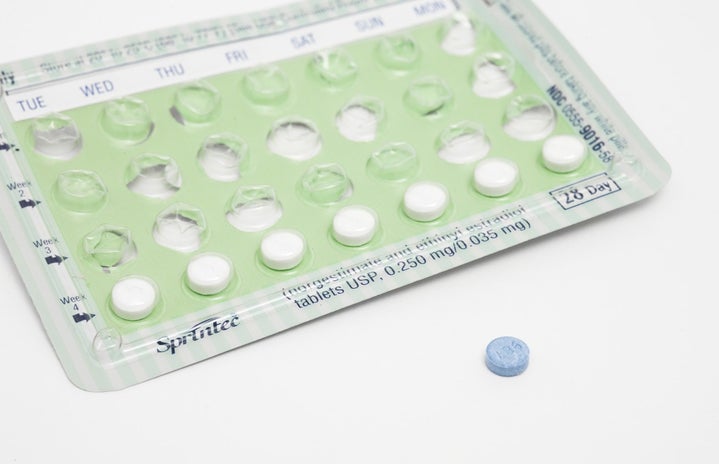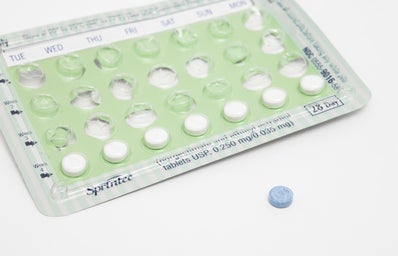Trying to figure out what exactly what’s going on “down there” can be a scary process for collegiettes. Even common problems can serve as a source for a major freak-out since symptoms can indicate a wide range of problems, some serious, and some that aren’t as big of a deal and often we don’t know which it is.
For example, a typical collegiette may freak when diagnosed with a yeast infection, even though it’s something 75 percent of women will deal with in their lifetime, according to the U.S. Department of Health and Human Services. Her Campus consulted several expert sources in order to discover the truth about yeast infections and shed some light on one of the most common infections a collegiette will likely deal with, so you can avoid the freak-out.
What exactly is a yeast infection?
Dr. Courtney Barnes, obstetrician and gynecologist at MU Health Care’s Women’s and Children’s Hospital explains, “A yeast infection is also known as vaginal candiasis. It is one of the most common causes of vaginal infections. A yeast infection is caused by a fungus called Candida. In a healthy woman’s vagina, small numbers of yeast can be found. When there is an imbalance between the bacteria and yeast in the vagina, however, the yeast can overgrow.”
For those of us that aren’t pre-med majors, a simpler explanation might be more helpful…
Basically, a yeast infection occurs when yeast, a type of fungus that is always found in the vagina, becomes overgrown, irritating lower parts of the reproductive system. In other words, a yeast infection is just that: an infection that can be easily treated without putting a damper on a schedule jam-packed with classes, homework, activities, and more.
What are the symptoms?
You’ve been feeling uncomfortable and itchy “down there” for days. Could it possibly be a yeast infection? “The most common symptoms that women experience are itching and burning on the outside of the vagina, also known as the vulva. Women may notice that the vulva is red and swollen. Some women may have a thick white vaginal discharge,” said Dr. Barnes.
Yeast infections are fairly easy to identify. The U.S. Department of Health and Human Services Office on Women’s Health explains, “The most common symptom of a yeast infection is extreme itchiness in and around the vagina.” The office also lists other symptoms to be on the lookout for, such as burning, redness, a rash, or swelling around your vulva or vagina, pain when trying to go to the bathroom or during sex, irregular vaginal discharge, or general soreness.
Why is this happening?
Time for a quick lesson in biology. According to Dr. Barnes, symptoms of a yeast infection occur at the point when yeast overgrows as a result of a bacteria and yeast imbalance. Certain behaviors can make an imbalance more likely to occur. “Some types of antibiotics can increase your chances of getting a yeast infection because they kill the normal bacteria that lives in the vagina. Women who are pregnant, have diabetes, and have a suppressed immune system are also more likely to suffer from yeast infections,” she said.
None of the above apply to you? Planned Parenthood also outlines several common causes of yeast infections. The organization’s website explains that common “side effects” that come with college such as stress, a poor night’s sleep from pulling an all-nighter, too many greasy or sweet late-night snacks, or hormonal changes associated with things like getting your period can also increase the risk of developing a yeast infection.
[pagebreak]
What should I do if I think I have a yeast infection?
It can be hard to make time for something as awkward and uncomfortable as a visit to your gynecologist, but if you’re unsure about what’s going on or if it’s your first infection, a visit to the gyno is your best option.
Dr. Barnes also explained what happens during a routine diagnosis appointment. “A yeast infection can be diagnosed by your doctor by using a speculum and swabbing some of the discharge. This discharge can then be examined under a microscope,” she described. “If you have never been diagnosed with a yeast infection before, I would recommend seeing a doctor to ensure this is the correct diagnosis. There are some other types of infections that can cause similar symptoms.”
Dr. Barnes also recommends paying a visit if symptoms are severe to the point where you’re having trouble focusing in classes, or they’re stopping you from enjoying your normal routine. A visit might also be helpful if you’ve had infections before, and regular treatment options don’t seem to be making a difference.
Ugh, a positive diagnosis. Now what?
If the diagnosis is positive, you’ll most likely be prescribed an anti-fungal medication in the form of a cream, tablet, or ointment, all of which can be found as over-the-counter medications in a drug or grocery store, according to the Department of Health and Human Services’ website. Your symptoms should clear up within three days.
Getting a confirmed diagnosis after an in-person visit with your gyno is the best way to learn about different treatment options. Dr. Barnes explains that during your appointment, “a yeast culture can be obtained to determine the exact species of yeast growing and which treatment would work best.”
However, according to Dr. Barnes, “If you have had yeast infections before and you are experiencing another infection that feels the same as the last time, there are over-the-counter medications that treat the most common yeast found.”
When in doubt, have it checked out. Talking things over with a professional could help you pinpoint the best way to treat an infection, especially if this is your first one, and can help prevent infections from more infections occurring again. Being checked out by your doctor also ensures there aren’t any other problems or complications from the infection. Dr. Barnes says she’s seen women damage skin around the vagina before by doing things like scratching too hard if itching becomes intense. Even though treatment is easy to obtain, it never hurts to play it safe and get an official confirmation.
Can I still have sex while I’m infected?
Medically speaking, it’s okay to remain active even if you’re dealing with a yeast infection. Sex may not be entirely comfortable though while you’re infected. Dr. Barnes explains, “Vaginal yeast infections are not sexually transmitted nor are they contagious. You cannot pass this infection to your partner during intercourse. Some women who have an active yeast infection may find having sex uncomfortable due to their symptoms. In that case, a patient should wait until her symptoms resolve before having intercourse.” It’s entirely up to you and your partner whether or not you both want to remain active while infected.
Are yeast infections preventable?
The best way to prevent yeast infections along with other forms of vaginitis is by keeping “down there” clean and dry. The U.S. Department of Health and Human Services Office on Women’s Health outlines several preventive measures collegiettes can take to prevent an infection, including:
- Avoiding scented bubble baths, sprays, and pads (it’s a bummer, but the scents could irritate your vagina and the surrounding area)
- Regularly changing pads and tampons during your period,
- Wearing “breathable” clothing like cotton underwear that fit properly and aren’t too tight
- Changing out of wet swimsuits or exercise clothes as soon as possible
The Department of Health and Human Services estimates that almost half of the women living in the U.S. will have to deal with two or more yeast infections in their lifetime. Luckily, infections are easy to diagnose, and even easier to treat, leaving you a happy and 100 percent healthy collegiette once again!
Photo Credits:
http://cureforyeastinfection.us/wp-content/uploads/2011/08/yeast-infection-girl.jpg
http://www.marvelous-girl.com/wp-content/uploads/2010/10/woman-yeast-infection.jpg
http://vaginalinflammation.com/wp-content/uploads/2011/10/Itchy-Vagina.jpg
http://vaginalinflammation.com/wp-content/uploads/2011/10/Itchy-Vagina.jpg

